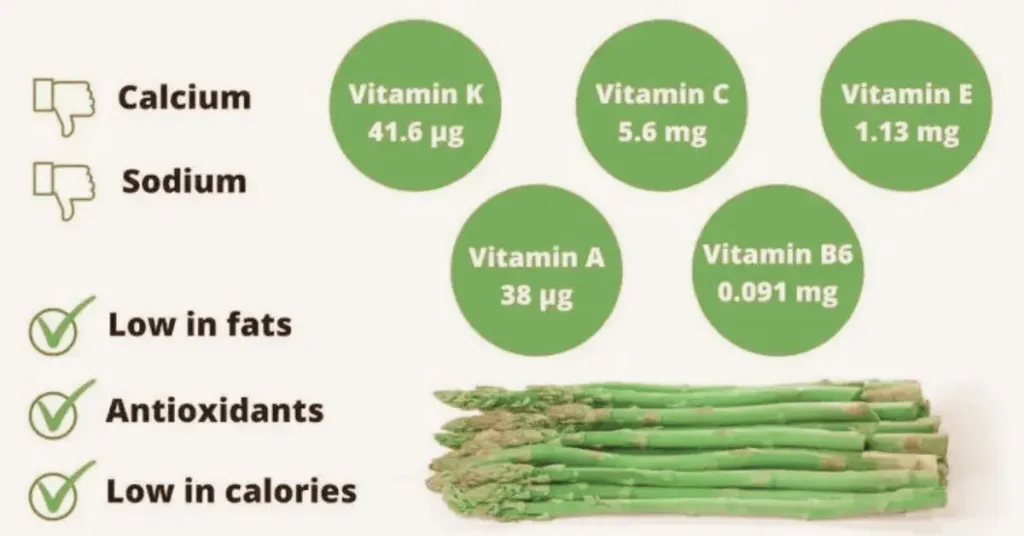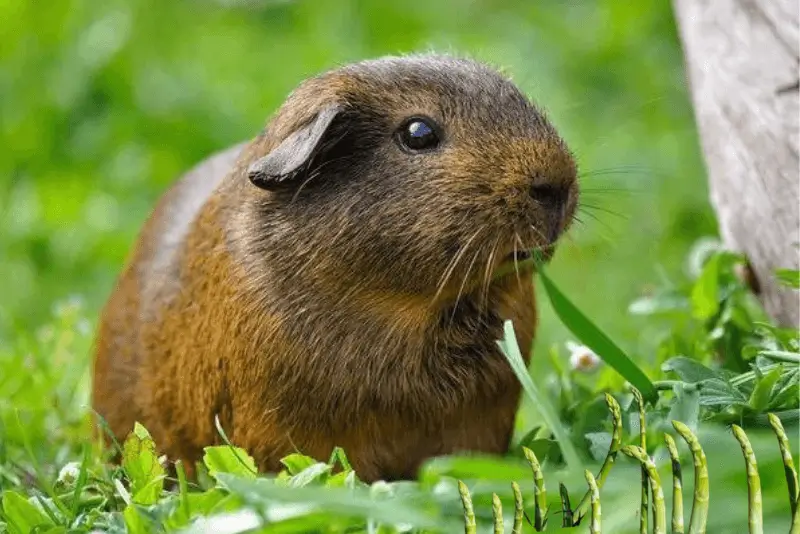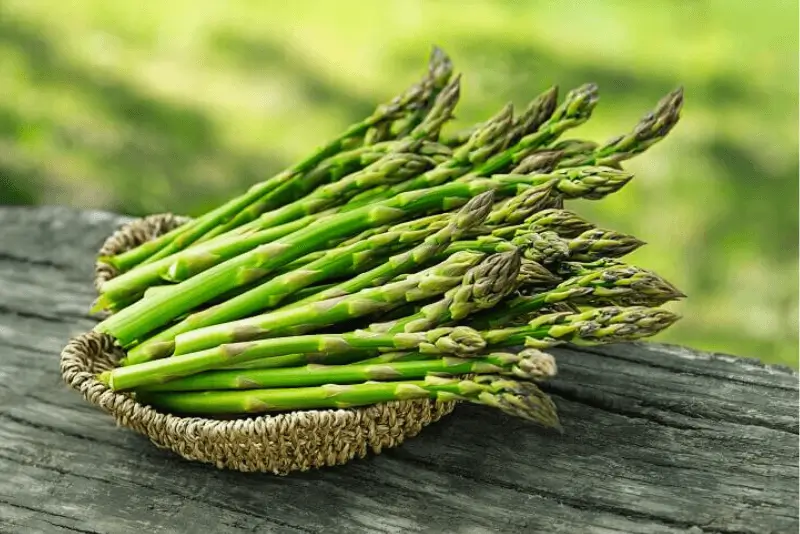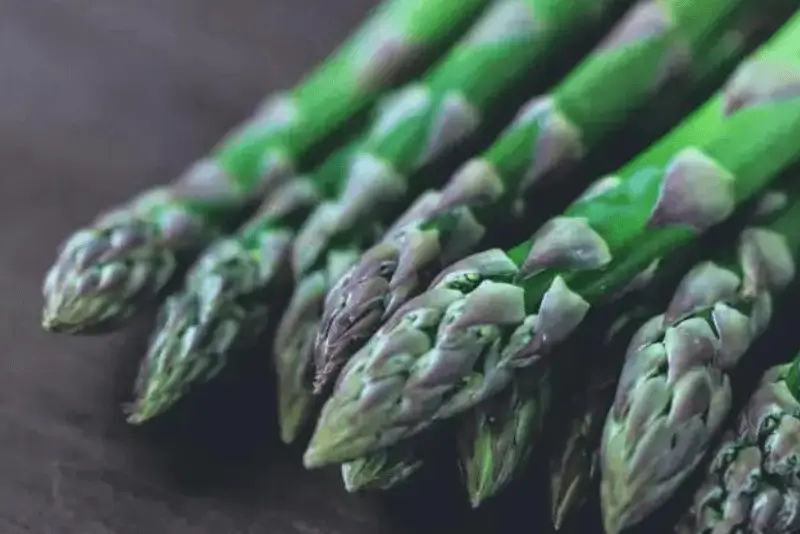Can Guinea Pigs eat Asparagus? Many pet owners wonder if guinea pigs can eat asparagus for a healthy and varied diet. The good news is, yes, guinea pigs can enjoy asparagus. When given in moderation, asparagus provides important vitamins and minerals for their well being. This article explores the benefits of asparagus, how to introduce it to your guinea pig’s diet, and answers common questions. Whether you know a lot about guinea pigs or just started taking care of these cute pets, our guide has useful tips.
It talks about why it’s important to give them different kinds of food to stay healthy. So, whether you are experience owner or new to having guinea pigs, this guide helps you to understand the need for a mix of foods in their diet.
Nutritional Benefits of Asparagus for Guinea Pigs
Asparagus is a fantastic source of nutrients for your guinea pigs, providing numerous benefits. Its low sugar and high fiber content make it excellent for digestion, promoting a healthy gut and preventing constipation. Since guinea pigs can’t produce their own vitamin C, asparagus becomes a crucial source of this essential nutrient. Additionally, it contributes vitamin K, which is vital for blood clotting. So, feeding your guinea pigs asparagus is like giving them a super healthy treat.
Now, let’s talk about the special things in asparagus that keep your guinea pig’s heart healthy. Folic acid plays a role in cell growth and development, while potassium helps regulate blood pressure and muscle function. Asparagus is also a good source of antioxidants, which can help protect the body from free radical damage.

The following are the nutrition facts for 100 g of the asparagus:
Guinea Pigs eat Asparagus | Is Asparagus Good for Guinea Pigs?
Health Benefits of Asparagus
Asparagus is not only tasty for us but also good for our furry friend Guinea pigs. Let’s discover why adding this green vegetable to your guinea pig’s meals can be a fantastic idea.
Scurvy Prevention
Guinea pigs can not make vitamin C on their own, and that can lead to a sickness called scurvy, which can be really bad, even deadly. Giving them asparagus can help because it’s full of vitamin C. This vitamin is super important for keeping your pet’s immune system strong and preventing scurvy. Also, the antioxidants in asparagus help fight bad stuff in their bodies, keeping your little friend’s cells healthy.

Guinea Pigs eat Asparagus but the level of Vitamin C in Asparagus are not enough for guinea pigs. So its important to provide them with other vegetables that are rich source of this vital vitamin for Guinea Pigs.
Antioxidants
The good things in asparagus really help your guinea pig stay healthy. They boost the immune system and stop urinary tract infections. Asparagus, like other green veggies, has strong antioxidants that protect cells from bad stuff like stress and free radicals. There’s a lot of vitamin E in asparagus, which acts like a superhero, keeping your guinea pig safe from harm caused by free radicals.
Also, there is beta carotene, lutein, and zeaxanthin in asparagus, and they work like superheroes too, protecting your guinea pig from free radicals. Asparagus also helps lower cholesterol and makes their eyesight better.
Improving Digestion
Asparagus is a healthy food for your guinea pigs. It is a rich source of vitamins and minerals that support overall well being. It’s good for digestion, provides essential vitamins like A and K for skin, vision, and immune health, and offers antioxidant protection against stress and radicals. As a low-calorie vegetable, asparagus supports weight management and to avoid problems with being too heavy. Beyond nutrition, it adds variety to meals, but introducing it gradually is crucial.
Better Bone and Teeth Health
Guinea Pigs eat Asparagus and it is a nutritional powerhouse for guinea pigs, providing a delectable addition to their diet while promoting robust bone and dental health. Packed with essential nutrients such as Vitamin K, calcium, and magnesium, asparagus supports optimal bone mineralization, growth, and development in these small companions. The calcium-magnesium duo works synergistically to fortify bones and teeth, ensuring well-rounded skeletal health. Asparagus contributes to the overall growth and development of guinea pigs, offering a delightful variety to their diet. Remember to introduce it gradually and seek vet advice for a balanced diet.

Boosts Immune System
Guinea Pigs eat Asparagus and it serves as a nutritional powerhouse for guinea pigs, and it’s really good for them. Rich in Vitamin K and antioxidants, it strengthens the immune system, providing essential support for disease resistance. Beyond immunity, its fiber content enhances digestive health, preventing common issues. Asparagus also brings anti-inflammatory properties, promoting overall comfort. Surprisingly, it contributes to heart health by supporting healthy blood circulation. Introducing variety into their diet, asparagus adds a delightful change to meals. Moderation and gradual introduction are key, with veterinary guidance for a well balanced diet.
Possible Risks of eating Asparagus to Guinea Pigs
Feeding guinea pigs too much asparagus can pose certain risks, and some of these are discussed below.
Urinary Problems & Bladder Stones
Grown-up guinea pigs shouldn’t eat too much asparagus because it contains calcium and sodium, which might cause problems. Baby guinea pigs need calcium for growth, but as adults, they require different types of food. Excessive calcium and sodium can lead to serious issues, including urinary problems and the formation of bladder or kidney stones. Asparagus has less calcium than some other vegetables, but it’s still important to be careful and not give them too much.
If you decide to give your guinea pigs a bit of asparagus, make sure it’s just a small amount. It’s also good to provide them with a mix of different foods like vegetables, hay, and pellets to keep them healthy. Always watch out for any changes in their behavior or if they seem different.
Diarrhea and Other Stomach Problems
Feeding guinea pigs too much asparagus can lead to discomfort, including issues like diarrhea and bloating. Overfeeding may cause stomach problems due to their delicate digestive systems. The sugar content in asparagus can be harmful, and its high fiber may induce stomach uneasiness.
Bloating is a common problem with excessive asparagus consumption. Guinea pigs’ tolerance varies, so it’s important to introduce new foods slowly, monitoring their reactions for signs of lethargy or irregular bowel movements. A well-balanced diet, including various vegetables, hay, and pellets, is crucial. If concerns persist, consulting a veterinarian for personalized advice is recommended for the overall health and happiness of your guinea pigs.
Allergies
It’s possible that your guinea pigs might be allergic to asparagus. If you are introducing asparagus to them for the first time, provide only a small amount and observe for any signs or symptoms after feeding. Common symptoms include vomiting, diarrhea, sneezing, and a runny nose. If you notice any of these, stop feeding asparagus to keep your guinea pigs healthy.
Serving Size and Frequency of Asparagus for Guinea Pigs
Guinea pigs being small animals, it’s important to offer them asparagus in moderation. A small piece, around one to two inches in length, is sufficient to provide essential nutrients without causing problems for their digestive system. Ensure the asparagus is properly washed, and any tough or fibrous parts are removed before serving.

Frequency
Asparagus should not be a daily treat for your guinea pig. It’s important for them to have a balanced diet with fresh hay, pellets, and a variety of leafy greens and different vegetables. Asparagus can be a special treat, but it’s best to give it only once or twice a week. Limiting their asparagus consumption helps maintain a well-rounded diet and avoids potential health risks associated with overfeeding.
Preparation of Asparagus for Guinea Pigs
Guinea pigs eat asparagus, and here are the steps for preparing it for them.
Step 1: Buy Fresh Asparagus
- Get fresh asparagus from a grocery store.
- Check if the tips are firm for freshness.
Step 2: Wash Asparagus Properly
- Clean the asparagus thoroughly to remove dirt, germs, and chemicals.
- Ensure it’s safe for your guinea pigs.
Step 3: Drain Excess Water
- After washing, use a strainer to remove extra water.
- Asparagus already has water content.
Step 4: Get Ready to Do Some Chopping
- Place the washed asparagus on a board.
- Cut small, easy-to-chew pieces.
- Some keep the woody part for teeth benefits.
Step 5: Serve it Fresh
- The chopped asparagus is ready for your guinea pigs.
Step 6: Clean the Area
- Wipe the area clean to prevent flies and germs.
- Wash thoroughly to remove potential pesticides.
- Cut into 1-inch sections; each guinea pig should have a maximum of two sections.
- Never offer cooked asparagus; guinea pigs aren’t adapted to processed foods.
More Information About Guinea Pigs and Asparagus
Can Guinea Pigs Eat Asparagus Stalks/Asparagus Stems?
Guinea pigs can eat asparagus stalks, which have a crunchy and rough texture beneficial for their dental health. Chewing on the stems helps naturally wear down their molar teeth, preventing dental issues. Including asparagus stalks in moderation is a positive addition to their diet, providing an enjoyable and dental friendly chewing experience. However, it’s crucial to be mindful of serving sizes and the frequency of offering asparagus stalks to maintain a balanced and healthy nutritional intake for guinea pigs.
Can Guinea Pigs Eat Asparagus Tips?
Guinea pigs can enjoy asparagus tips as a tasty treat, but it’s important to wash them thoroughly, serve in moderation, and monitor for any adverse reactions. Freshness and color are key factors, and introducing small amounts gradually ensures the treat is well-received. Asparagus tips contribute to diet diversity, providing essential nutrients and supporting digestive health through fiber.

Can Guinea Pigs Eat Asparagus Ends?
Guinea pigs can eat raw asparagus, which has important vitamins and minerals. The tough ends of asparagus, usually not eaten by people, can be fun chew toys for guinea pigs. Every guinea pig may have different taste preferences, so watch how they react to know what they like. It’s important to slowly introduce new foods and keep an eye out for any signs of discomfort or allergies to keep your guinea pigs happy and healthy.
Can Baby Guinea Pigs Eat Asparagus?
Yes, baby guinea pigs, or pups, can safely eat asparagus, but it’s crucial to introduce it gradually and in moderation. Their early diet should mainly consist of fresh alfalfa hay, water, and their mother’s milk. Around three weeks old, you can slowly introduce vegetables and fruits. When adding asparagus, wash it thoroughly, cut it into small pieces, and serve it fresh. Monitor the baby guinea pigs for any signs of digestive discomfort and consult a veterinarian if needed. Gradual introduction and close observation ensure a positive and healthy transition to a varied diet for baby guinea pigs.
How Much Asparagus Can Guinea Pigs Eat?
Guinea pigs especially merino guinea pigs can eat asparagus in moderation, and it offers essential vitamins and minerals. However, careful introduction is crucial due to its high water content. Start with small amounts to avoid digestive issues, and observe your guinea pig’s response. Asparagus supports dental health through natural chewing. Ensure a balanced diet with hay, pellets, and various veggies. Limit asparagus to a few small slices, serving no more than twice a week to prevent potential bladder stone issues. Regular monitoring and consultation with a vet contribute to the overall health and well-being of your guinea pig.
Interesting Facts About Asparagus
Guinea pigs eat asparagus and here are some interesting facts on asparagus:
- Asparagus belongs to the Asparagaceae family and is scientifically known as Asparagus officinalis.
- It is a perennial plant, living for more than two years, famous for its early spring shoots.
- Asparagus comes in green, white, and purple varieties, with color determined by factors like chlorophyll, sunlight, or anthocyanins.
- A nutrient-dense vegetable, asparagus is rich in vitamins A, C, E, and K, as well as minerals like folate, potassium, and fiber.
- It contains antioxidants such as glutathione and rutin, contributing to potential health benefits.
- Commonly prepared by steaming, boiling, grilling, or roasting, with tough ends trimmed before cooking.
- Some people experience a distinct urine odor after consuming asparagus, attributed to sulfur-containing compounds.
- Asparagus is a low-calorie vegetable, making it a healthy option for those watching their calorie intake.
- Cultivated for over 2,500 years, asparagus likely originated in the eastern Mediterranean region.
- Its growth is influenced by soil temperature, thriving in warmer conditions.
FAQ’s
Can guinea pigs eat raw asparagus?
Yes, guinea pigs can eat raw asparagus. It provides essential vitamins and minerals, and the tough ends can serve as beneficial chew toys.
What are the potential issues with feeding asparagus to guinea pigs?
Excessive consumption may lead to constipation and gases. It’s important to monitor their reactions, introduce it slowly, and seek veterinary advice if needed.
Should I wash asparagus before feeding it to my guinea pig?
Yes, always wash asparagus thoroughly to remove dirt, germs, and pesticides. This ensures the safety of your guinea pig.
Can guinea pigs eat asparagus every day?
No, asparagus should be an occasional treat, ideally no more than once or twice a week. A well-balanced diet primarily consists of fresh hay, pellets, and a variety of leafy greens and vegetables.
Is asparagus safe for all guinea pigs?
While many guinea pigs enjoy asparagus, it’s essential to observe your pet’s reactions. Some may have allergies or sensitivities, so introducing it slowly is crucial.
Conclusion
Guinea pigs eat asparagus, but it’s essential to ensure that you feed it to them correctly for their well being and happiness. Asparagus, particularly the stems, is beneficial for their dental health. However, it’s crucial not to overfeed and to be mindful of potential allergies and calcium levels. Introduce it slowly into their diet, observe their reactions, and consult with a vet if needed.






